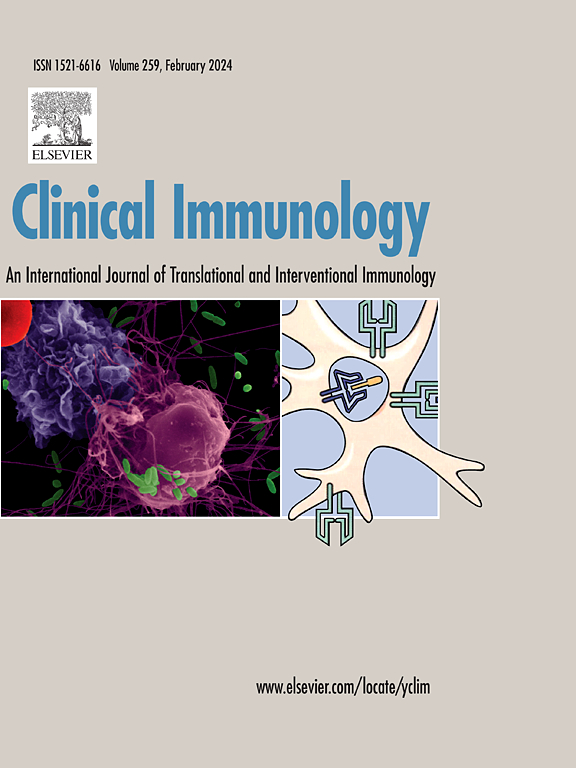PD‐1 monoclonal antibody (Tislelizumab)-induced DRESS syndrome in an intrahepatic cholangiocarcinoma patient with FGFR3 mutation and elevated IgG4:A case report
IF 3.8
3区 医学
Q2 IMMUNOLOGY
引用次数: 0
Abstract
Background
Immune-related adverse events (irAEs) include a rare, idiosyncratic but potentially life-threatening drug reaction with eosinophilia and systemic symptoms (DRESS), characterized by exanthem, fever, as well as hematologic and visceral organ involvement.
Case presentation
We describe a 54-year-old man under the novel sequential treatment including all-trans retinoic acid (ATRA) and programmed death protein 1(PD-1) antibody (Tislelizumab) for advanced intrahepatic cholangiocarcinoma (iCCA). He was found to have Tislelizumab-induced DRESS syndrome during adjuvant therapy, and also showed the evidence of IgG4-related lymphadenopathy (IgG4-RLAD) as well as Epstein-Barr virus (EBV) infection in the absence of hemophagocytic lymphohistiocytosis (HLH) and T cell lymphoma. The patient's clinical status was successfully ameliorated through the administration of corticosteroids, intravenous immunoglobulin (IVIG), and antiviral agents, demonstrating a positive response to the treatment protocol. He was the first-ever case report of Tislelizumab-induced DRESS syndrome in the context of IgG4-RLAD with an exploration of potential mechanisms. Furthermore, we found that a somatic fibroblast growth factor receptor (FGFR) 3 p.P774L mutation at the frequency of 1.96 % was detected in his iCCA tissue.
Conclusion
These findings indicated that this novel therapy, based on ARTA and PD-1 antibody, is more effective and could guide the clinical application of PD-1 antibody in the iCCA patients with elevated IgG4. Human leukocyte antigen (HLA) typing assay might help to screen the potential susceptible individuals to avoid immune checkpoint inhibitors (ICIs)-induced DRESS syndrome.
PD - 1单克隆抗体(Tislelizumab)诱导的FGFR3突变和IgG4升高的肝内胆管癌患者的DRESS综合征:1例报告
免疫相关不良事件(irAEs)包括一种罕见的、特殊的但可能危及生命的药物反应,伴有嗜酸性粒细胞增多和全身症状(DRESS),其特征是惊血、发烧以及血液和内脏器官受累。病例介绍:我们描述了一位54岁的男性患者,接受了包括全反式维甲酸(ATRA)和程序性死亡蛋白1(PD-1)抗体(Tislelizumab)在内的新型序贯治疗,以治疗晚期肝内胆管癌(iCCA)。在辅助治疗期间,患者被发现有tislelizumab诱导的DRESS综合征,在没有噬血细胞性淋巴组织细胞增多症(HLH)和T细胞淋巴瘤的情况下,患者还表现出igg4相关淋巴结病(IgG4-RLAD)和eb病毒(EBV)感染的证据。通过使用皮质类固醇、静脉注射免疫球蛋白(IVIG)和抗病毒药物,患者的临床状况得到了成功的改善,对治疗方案有积极的反应。他是第一个在IgG4-RLAD背景下tislelizumab诱导的DRESS综合征的病例报告,并探索了潜在的机制。此外,我们发现在他的iCCA组织中检测到体细胞成纤维细胞生长因子受体(FGFR) 3p.p 774l突变,频率为1.96%。结论基于ARTA联合PD-1抗体治疗IgG4升高的iCCA患者效果更好,可指导PD-1抗体的临床应用。人白细胞抗原(HLA)分型分析可能有助于筛选潜在易感个体,以避免免疫检查点抑制剂(ICIs)诱导的DRESS综合征。
本文章由计算机程序翻译,如有差异,请以英文原文为准。
求助全文
约1分钟内获得全文
求助全文
来源期刊

Clinical immunology
医学-免疫学
CiteScore
12.30
自引率
1.20%
发文量
212
审稿时长
34 days
期刊介绍:
Clinical Immunology publishes original research delving into the molecular and cellular foundations of immunological diseases. Additionally, the journal includes reviews covering timely subjects in basic immunology, along with case reports and letters to the editor.
 求助内容:
求助内容: 应助结果提醒方式:
应助结果提醒方式:


